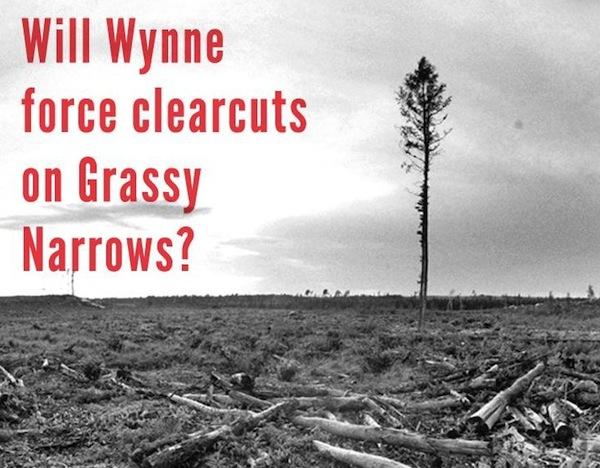As previously mentioned, the Ontario government has approved plans for another decade of clearcut logging in Grassy Narrows Territory against the will of this Indigenous community. The Grassy Narrows First Nation (or Asubpeeschoseewagong First Nation as it is traditionally called in Anishinaabek) and its community members have been involved in the longest-running Indigenous blockade in Cananda for over 10 years; but, the history of injustice, colonialism and contempt for the community is much longer.
Recently, Assembly of First Nations Ontario Regional Chief Stan Beardy has called for an immediate blockade of logging operations if the Ontario government’s plan to allow clear-cutting of mature trees within the Grassy Narrows First Nation territory goes forward.
“At the end of the day, if we’re forced to take direct action that’s what will happen,” said Beardy, who represents the chiefs of the 133 First Nations in the province of Ontario.
Grassy Narrows First Nation is known for holding the longest-running Indigenous logging blockade in Canada and has spent nearly 15 years in court fighting the Ontario government’s decision to issue a license for clear-cutting operations in Keewatin, part of the Nation’s treaty-protected territory. In 2011 Ontario Superior Court ruled that the province cannot authorize timber and logging if the operations infringe on federal treaty promises protecting aboriginal rights to traditional hunting and trapping. This ruling has been appealed by Ontario and is expected to be heard at the Supreme Court of Canada on May 15, 2014.
“The blockade was put on hold because we were under the impression that with the lawsuit pending, all [logging] activities had been put on hold, but unfortunately it looks like that’s not happening,” Beardy said.
Despite the Superior Court ruling, in December Ontario Premier Kathleen Wynn unilaterally approved a forest management to further clear-cut mature trees with the Grassy Narrows First Nation territory without community consultation or consent.
“The duty to consult” with First Nations on issues and projects that affect them and their lands is a legal requirement in Canada, “but they ignore the Constitution and legislation to consult with the legal holder of traditional lands,” Beardy said. “So if the logging starts up again, so will the blockage. Unfortunately, it seems to be the only way they’ll pay attention to us. We tried the political process, we tried having a conversation with them.”
Members of the beleaguered Grassy Narrows First Nation say the Ontario government’s logging plans over the years have adversely affected forests in their community and worsened the mercury poisoning issues their citizens have been grappling with for decades.
“Premier Wynne, it is within your power to ensure that the mistakes of the past are not repeated at the expense of another generation of Grassy Narrows children,” Grassy Narrows First Nation Chief Simon Fobister said. “I call on you to intervene to repeal this hurtful plan and to ensure that never again will Ontario attempt to force decisions on our people and our lands.”
The province’s new logging plan would clear-cut much of the remaining mature forest on Grassy Narrows territory. The tree removal not only worsens the effects of mercury poisoning but also threatens the existence of First Nations people culturally, Beardy said.
Clear-cutting violates First Nations treaty rights and the constitutionally protected rights to hunt, fish and trap because it destroys the environment and the animal and fish habitats and the wildlife itself that provides sustenance to the people, Beardy said.
“When First Nations people in Canada look at the [land taken], the residential schools, and now this that has happened to us, we consider it cultural genocide and that’s the message we’re taking to the international level [at the United Nations] to say that our rights as First Nations people are not respected in Canada,” he said.
Fobister said his community has requested a meeting with Ontario Minister of Natural Resources David Orazietti in an effort to reach an understanding on how to move forward.
Although Prime Minister Stephen Harper’s government endorsed the UN Declaration on the Rights of Indigenous Peoples in 2010, “they consider it an aspirational document, a document with beautiful words,” said Beardy. “We’re pushing very hard to get Canada to adhere to the principle of ‘free prior and informed consent.'”



